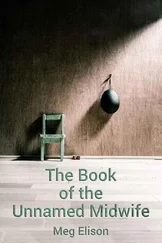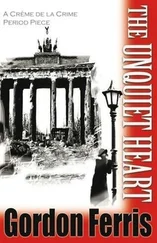They were counting on something new, a clinical trial. She was in it for everything she had.
She hoped he’d died indoors. She didn’t think it was likely but the alternative was unthinkable, dying in a frozen field, or in some doorway in a distant city, alone until some inquisitive soul bent down, and the gapers started to cluster, and the cops found nothing, no wallet, no phone, nothing, and so had no next of kin to call. That was how they came to mourn him, she and Becka, without really mourning him, a totally unsatisfying way to mourn. Then he walked into the room, ravaged by the acts of time, thinner than she had ever known him to be, who knew every inch of him by touch, sundered from every appearance of happiness, suffering every ailment except immobility, and it took everything in her power to attribute his reappearance to the determination of a man who loved her, and not to a merciful act of God.
After Becka left with Jack, he drew a chair over to her bed and explained where he had been and how he had come to be there.
“I thought the worst,” she said.
“That I would be alive and look like this?”
The film of tears that glazed over her dark and hollowed eyes quivered as she smiled. She squeezed his few fingers, no less bony and fragile than her own. “I think you look devastating,” she said.
“Devastated?”
“As handsome as you ever were.”
“Now there is a tender lie,” he said.
They got reacquainted after so long a time apart. He said little at first because there was so little to say, confusing his experiences on the road for the ordinary banality of endurance. They came to know him at the hospital, where she referred to him as her husband again, and they adjusted to the sight of a man they would ordinarily expect to be tending to in a room of his own walking in and out of hers. He did not smile at them, at the nurses at their station. He hardly even cast them a glance. He said nothing unless it was to ask for something on her behalf, and he came and went like a tinker or beggar, in the same hitchhiker’s outfit, if not the very same clothes, and with a heavy backpack swaddling his skinny frame.
Though returned to her at last, his body continued its demands and he was forced to leave her at a moment’s notice. This was a new twist in an old cruelty, as time now meant so much more to him than those odious deposits of downtime and distant walks that had come to define these latter years. They could not say how much time she had left, and to leave under such circumstances was prodigal, ridiculing any sentiment of homecoming.
He discharged the walks with dutiful resignation, the way a busy hangman leaves for the day without scruple or gripe, and then he turned around and walked back.
“Where do you go when you leave?”
“I go lots of places.”
“When you left yesterday, where did you go?”
“Yesterday I went to the beach,” he said.
He removed from his pocket a smooth seashell with a swirl of brown leading into its dark hollow. The top of the shell spiraled to a sharp point. He put the shell in her hand and then sat down in the chair in the corner.
It was the perfect shell, exotic and intact. This was no Rockaway shell or Coney Island shell, not even a Jersey Shore shell. To get a shell like this, you had to walk to the Caribbean.
“Where did you get this? You can’t find a shell like this around here.”
“I told you. I went to the beach.”
“What beach? What was it like?”
“At the beach? It was cold.”
“What did you see there?”
“Well,” he said. “I saw nothing, really.”
“You walked and walked,” she said. “You must have seen something.”
“On the way I remember seeing an old woman. She was in her nightgown but with a heavy overcoat. She wore a pair of pink boots and she was raking leaves in front of a brownstone.”
“What else?”
“People leaving a building for the evening.”
“What else?”
“I ran my hand along a chain-link fence.”
“What else?”
“That’s it. That’s all I remember.”
“In all that time?”
“That’s it,” he said.
For the first time he began to pay attention to the things he saw on his walks, so that when he returned to her, he had observations of the outside world to share. They were fleeting, they were middles without beginnings or ends, but they were diverting — for him to witness, for her to hear. She soaked them up. They seemed just as much nourishment as whatever the doctors were providing.
He realized he might have been doing it wrong for years. He might have seen interesting things had he been able to let go of the frustration and despair. He wondered what kind of life he might have had if he had paid attention from the beginning. But that would have been hard. That would have been for himself. It was easier now, doing it for someone else.
“I saw a woman in a leather apron outside a beauty salon, smoking a cigarette. I saw two cops standing around the remains of an accident, broken reflector bits on the pavement. I heard kids running behind me and then they overtook me like a herd of cattle and they all wore the same school uniform but each one still looked so different. I smelled chocolate for almost a mile. I saw some men playing soccer and I thought I could even see the steam coming off their bodies. It’s getting colder.”
She interrupted. “When I get better, do you think it might be possible for us to go on vacation together?”
“Of course,” he said. “Of course that’s possible.”
They discussed different places. She offered a new country, and then he suggested another, and they grew more and more excited. There was nowhere the two of them would not have enjoyed. They agreed on the African safari they had planned many years before but had never taken.
He stood in the window holding the baby in his arms, rocking back and forth to keep Jack dozing happily against his body. The weight was a glorious burden. The little lumpy fellow and he each shared their body heat. Jane was asleep in the hospital bed. Becka sat against the far wall of the room, reading a magazine. They had worked out the procedure for what to do if he suddenly had to go, but for the moment, in that unlikely place, a wonderful peace was holding. He had even taken off his boots. The window was radiant with cold sunlight. The only noise was the imaginary one that came from dust motes slowly tumbling in the light.
He came into the room and pulled the chair close and sat down next to her.
“I saw a dog in a purse. I saw bread being delivered, loaves of bread in paper sacks, dropped off in front of an Italian restaurant. Later in the morning I saw a bodybuilder in nothing but a T-shirt and sweatpants, such an enormous pair of arms, leave a health club and trip over himself. He went down with his gym bag, and a woman with a baby stroller stopped to ask him if he was all right. I saw a quiet street where I thought you and I could live very happily, a street of brownstones with good little yards. I saw a man chipping the ice off his windshield with a butter knife. And it was working! I saw the Metropolitan Museum of Art. Even at this time of year, people are sitting on the steps out front like it’s the Fourth of July. I saw the last of the last of the light. Should I go on?”
She had her eyes closed. “Close the door,” she said.
He stood up and closed the door. She took down her pajama bottoms. He saw what she was doing and reached out for a chair and placed it in front of the door. He turned off the light and walked back to her as shadows began to assert themselves in the room. He climbed on from the foot of the bed and pulled her to him until her head left the pillow. A small spray of hair still clung there. She began to unzip him. He wasn’t sure what to expect. He couldn’t rule out one final treachery of the body, which if it had its way, he thought, would crown its triumph of cruelty by depriving him — them — of this too. But he overestimated its power, or underestimated his own. Or did they both want the same thing? Now was not the time to wonder. Now was the time to forget his body and to look at her. He needed nothing but the look she returned. Then she shut her eyes, and he shut his, and they began to concentrate. He found more strength in her than he expected. She moved under him with an old authority. He listened as she began to come, as she was coming, as the coming wound down to a long final sigh that accompanied a burst of static from the nurse’s intercom above the bed. He used the pillow to muffle himself. It was a two-minute triumph for both of them, and afterward they calmly restored respectability to the room.
Читать дальше












